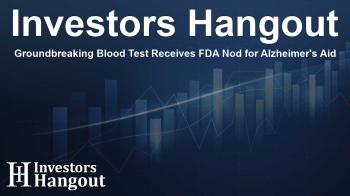Groundbreaking Blood Test Receives FDA Nod for Alzheimer's Aid

FDA Approves Innovative Blood Test for Alzheimer's Diagnosis
The recent approval by the FDA for the Lumipulse G pTau217/?-Amyloid 1-42 Plasma Ratio signals a major milestone in the battle against Alzheimer's disease. This marks the first blood test officially authorized to assist in diagnosing Alzheimer's, heralding a new era in patient care and treatment options.
A Transformative Moment for Patients and Clinicians
Dr. Howard Fillit, Co-Founder and Chief Science Officer of the Alzheimer's Drug Discovery Foundation (ADDF), expressed that this approval is indeed a transformative moment not only for patients but also for healthcare providers and the overall Alzheimer’s research community. He emphasizes that blood tests for Alzheimer's bring us closer to achieving timely and accessible diagnoses for all patients, an ambition that was once unimaginable. The approval of the Lumipulse test underscores years of scientific collaboration and progress bolstered by initiatives like the ADDF's Diagnostics Accelerator.
Support from Leading Philanthropists
Significant support for this breakthrough has come through the Diagnostics Accelerator, a chief initiative by ADDF that collaborates with influential philanthropists such as Leonard A. Lauder and Bill Gates. This initiative has been pivotal in fast-tracking the development of various diagnostic tools, including blood tests and digital health solutions, to enhance Alzheimer's diagnosis and treatment efficacy. The Diagnostics Accelerator has committed over $90 million to nearly 70 projects aimed at refining diagnostic practices.
Enhancing Accessibility and Early Intervention
The Lumipulse test is a minimally invasive and affordable diagnostic tool that can be used across diverse healthcare settings, notably in primary care. By identifying individuals at high risk for Alzheimer's, it facilitates earlier access to specialists, thereby optimizing intervention opportunities that may slow or prevent cognitive decline.
Pioneering Precision Medicine in Alzheimer's Care
Blood-based biomarkers are opening new avenues in precision medicine for Alzheimer's, allowing more targeted treatment strategies that address the multifaceted nature of the disease. Dr. Fillit remarks that this is only the beginning of a transformative journey; with the evolution of blood-based biomarkers, the landscape of Alzheimer’s care will fundamentally change, paving the way for enhanced precision medicine and preventive strategies.
About The Alzheimer's Drug Discovery Foundation (ADDF)
Founded in 1998 by Leonard A. and Ronald S. Lauder, the ADDF is solely focused on expediting the discovery of drugs aimed at preventing, treating, and curing Alzheimer's disease. It utilizes a unique venture philanthropy model to fund research in both academic and industry settings. The foundation has played a crucial role in the development of groundbreaking diagnostics like the Alzheimer's PET scan and blood tests, directly influencing the advancement of a robust drug pipeline. Thanks to its donors, ADDF has awarded over $370 million to support 765 drug discovery programs and clinical trials across 21 countries.
About the Diagnostics Accelerator (DxA)
The Diagnostics Accelerator, initiated in 2018, is a collaborative project worth $100 million from partners including notable figures such as Bill Gates and Jeff Bezos, focused on creating novel biomarkers for early Alzheimer detection. Its goal is to drive the development of accessible biomarkers and targeted treatments that address Alzheimer’s and related dementias. The initiative encourages translational research and provides expert consulting to the research community, promoting innovation in the field.
Frequently Asked Questions
What is the significance of the Lumipulse test?
The Lumipulse test represents a breakthrough in Alzheimer's diagnosis as it is the first blood test approved for aiding in the diagnosis of the disease.
How does the ADDF contribute to Alzheimer's research?
The Alzheimer's Drug Discovery Foundation accelerates the discovery of drugs through funding and supports projects that focus on developing diagnostics and therapeutics.
Who are key supporters of the Diagnostics Accelerator?
Prominent philanthropists, including Leonard A. Lauder, Bill Gates, and Jeff Bezos, are significant supporters of the Diagnostics Accelerator, aiding in its mission.
What types of projects has the Diagnostics Accelerator funded?
It has funded nearly 70 projects focused on developing biomarkers and diagnostic tools, such as blood tests and digital health solutions.
How much funding has the ADDF provided for Alzheimer's research?
The ADDF has awarded over $370 million for Alzheimer's drug discovery, supporting numerous programs and clinical trials.
About The Author
Contact Logan Wright privately here. Or send an email with ATTN: Logan Wright as the subject to contact@investorshangout.com.
About Investors Hangout
Investors Hangout is a leading online stock forum for financial discussion and learning, offering a wide range of free tools and resources. It draws in traders of all levels, who exchange market knowledge, investigate trading tactics, and keep an eye on industry developments in real time. Featuring financial articles, stock message boards, quotes, charts, company profiles, and live news updates. Through cooperative learning and a wealth of informational resources, it helps users from novices creating their first portfolios to experts honing their techniques. Join Investors Hangout today: https://investorshangout.com/
The content of this article is based on factual, publicly available information and does not represent legal, financial, or investment advice. Investors Hangout does not offer financial advice, and the author is not a licensed financial advisor. Consult a qualified advisor before making any financial or investment decisions based on this article. This article should not be considered advice to purchase, sell, or hold any securities or other investments. If any of the material provided here is inaccurate, please contact us for corrections.

